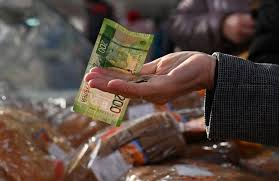Russia’s Economy Ran on War — Now its Stock Market is Pricing in Peace
The Russian stock market is rallying on peace hopes, even as the country’s wartime economy shows cracks.
Russian stocks climbed sharply after news broke that President Donald Trump and his Russian counterpart, Vladimir Putin, are set to meet in Alaska on Friday.
The Moscow Exchange Index — which tracks the stocks of Russia’s 40 largest companies — closed 1.4% higher on Monday, marking its third straight day of gains. The index has jumped about 8% since Thursday and is trading near a three-month high.
“Stock market players are counting on the beginning of a settlement of the Russian-Ukrainian conflict following the meeting of the presidents of the United States and Russia,” wrote Natalia Milchakova, the lead analyst at Freedom Finance Global, a Kazakhstan-based brokerage, in a Tuesday note.
Milchakova added that there’s growing optimism that some sanctions on Russian businesses could be eased if talks lead to de-escalation.
That upbeat market sentiment comes even as Russia’s war-fueled economy shows signs of strain. Years of elevated military spending — sustained by oil and gas revenues — are starting to lose momentum.
However, energy prices have remained persistently weak, undercutting one of the Kremlin’s most important sources of income.
Trump recently escalated his rhetoric against countries importing Russian oil, singling out India — one of Moscow’s top energy customers — and threatening secondary sanctions on countries that help Russia skirt restrictions.
“Why Vladimir Putin suddenly wants to have a ceasefire is that the new sanctions the US is threatening would be debilitating to Russia and its allies, like Brazil, China, and India,” wrote Louis Navellier, the founder and chief investment officer at Navellier and Associates.
Still, despite the rally, analysts warn that volatility is likely to persist as the summit’s outcome remains highly uncertain.
“Geopolitics remains a key source of volatility as participants weigh the prospects for real progress in the talks, given Trump’s statements about a possible territorial swap and both sides’ interest in a larger, long-term deal,” wrote Magomed Magomedov, an analyst at Russian financial firm Finam.
Beyond Russia, global investors are watching the Trump-Putin meeting closely for clues about broader impacts on the markets.
“On one hand, peace would stabilize energy supplies and reduce geopolitical haven-seeking,” wrote Thierry Wizman, a global foreign exchange and rates strategist at Macquarie Group.
That could weigh on traditional havens like the US dollar and the Swiss franc.
“But ‘peace’ could reverse defense and related infrastructure spending in Europe,” Wizman added.








